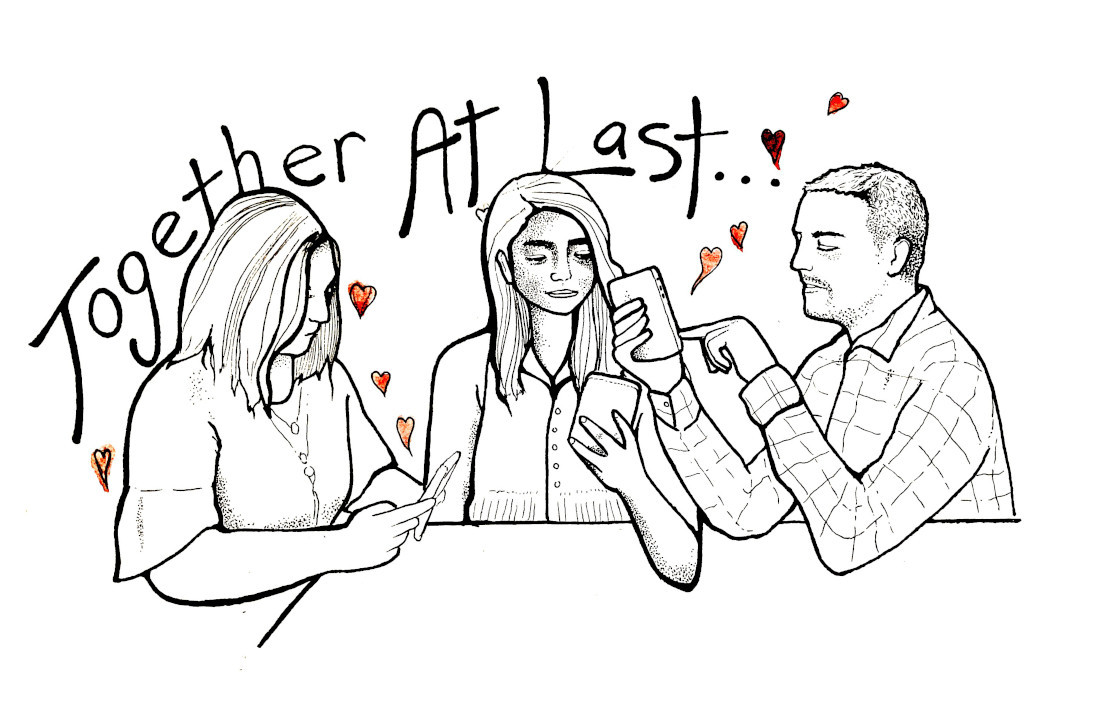A virtual love story
How Wordle helped my distanced, pandemic-fatigued family reconnect
Illustration by Gabrielle Funk
It wasn’t faces that drew me in, but letters scrawled across the back of a paystub. After solving the morning’s Wordle alone, my partner had written out spaces and clues, hangman-style, for his dad to complete. The pair worked together over coffee, aggravatingly solving the puzzle in fewer guesses than I needed.
Josh Wardle, a software engineer in Brooklyn, first created the daily guessing game to decode with his partner. In an article titled “Wordle is a Love Story,” New York Times reporter Daniel Victor describes the “once-a-day game, which invites players to guess a five-letter word.” After entering a guess, “the game tells you whether any of your letters are in the secret word and whether they are in the correct place. You have six tries to get it right.”
Wardle launched the game publicly in October 2021, and more than 300,000 people played in early January. A month later, my extended family sat around the dining table and joined them.
We gathered in celebration of my niece’s fifth birthday, but her party also marked one of the first times in two years that we met in person and unmasked. Surrounded by a half-eaten cake, empty glasses and fallen streamers, one by one, we pulled out our phones.
Instead of signalling the end of the night (and prompting scoldings from my nana), this action brought us together. I hadn’t yet played the game, but I finally caved and joined the competition. After almost two years without hours-long cribbage tournaments or riddles told over the campfire, we all needed to spend a little more time looking at our screens.
Soon, the “adults” side of the table began recounting top scores, sharing favourite starting words and passing around reading glasses to better see the tiny five-by-six grids. We laughed and teased and started to feel like us again.
In an op-ed for The Los Angeles Times, self-described “professional philosopher of games” C. Thi Nguyen posits a theory. “Wordle’s social energy is what makes it special,” he writes. “Those grids give us quick glimpses into other people’s minds.”
Wordle itself is similar to other board, word and puzzle games like Mastermind and Lingo. “What makes Wordle distinctive,” however, “isn’t the core gaming mechanism but the social life that it enables.” Users have the option to share graphics of their daily grids on. Nearly every morning, my homeroom students greet me by asking if I’ve solved the puzzle yet. And in my family, the game helps us reconnect after years spent mostly apart.
“Each Wordle grid is a neat synopsis of someone’s path of action, failure, choice and success. You can glance at it and grasp the shape of the player’s struggle,” he explains.
“Every day, Wordle gives everyone the same challenge and the same tools to meet that challenge. When you glance at another player’s grid, you can grasp the emotional journey they took, from struggle to likely victory, in one tiny bit of their day. All those yellow and green Wordle grids popping up on our screens give us a steady stream of small communions.”
Danielle Doiron is a creative and educator who splits her time between Winnipeg, Philadelphia and small Midwestern towns. Catch them reading, procrastinating or defending the pineapple on pizza.
Published in Volume 76, Number 24 of The Uniter (April 7, 2022)







